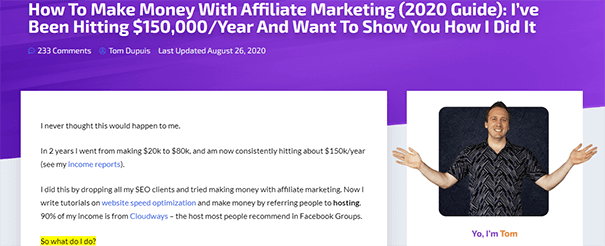6 Strategies To Monetize Your Blog & Profit From Your Knowledge
You create a blog and start publishing content. But how do you turn your content creation efforts into profit?
In this post, you will learn how to monetize your knowledge and finally start profiting from your blog.
Let’s get started:
Strategy #1: Freelancing
Leverage your blog to approach online publications, corporates or even small businesses within your niche.
The byline from guest posting on high-traffic blogs and social media marketing could prove even more beneficial for your own blog.
How?
Your blog:
- Acts as a portfolio
- Establishes your expertise and authority
- Increases traffic to your own blog
- Brings in more clients without having to chase them, and
- Improves your own understanding of what works and what doesn’t!
I know what you’re thinking.
Aren’t there enough bloggers out there?
Not enough who know their stuff!
The best part –
You needn’t restrict yourself to writing… you could offer every skill you have learnt while blogging. It could be social media management, SEO, WordPress, photography, graphic designing or even web designing.
To understand why, let’s just get into the pros and cons of freelancing.
Pros
- Make use of your spare time, rather than wasting it
- You decide how much you get paid
- Scale up your blog
- Far too many skills you can leverage
Cons
- The hustle never stops
- No work = No pay
- No job security
- Zero benefits
Strategy #2: Affiliate marketing
Affiliate marketing allows you to earn a commission every time a product is sold from your blog.
This involves partnering up with a brand for a product that your readers are genuinely interested in, something that you use or are most likely to use.
That’s a win-win for all three – you, the partnered brand and your readers.
Are you sure?
To make up your mind, let’s look at the pros and cons of affiliate marketing.
Pros
- Perfect for a beginner blogger who doesn’t have a lot of traffic yet
- Perfect for any blogger who doesn’t have a lot of time
- Can be used on any blogging platform such as Medium and LinkedIn via a unique affiliate link of the product that is generated for you
- By testing and believing in the product, you endorse the product that you are sure will be valuable. This increases trust and conversions amongst your readers.
- With zero investment and effort towards creating your own product, affiliate marketing can prove to be a significant source of income
Cons
- Commissions can be low
- If you fail to market products that are actually useful or valuable to them, your audience could get confused and eventually walk away
- You lack control over the products, its pricing, marketing or even the page it ultimately lands your reader to. Let’s hope (for the sake of your reader’s trust) that the landing pages are not faulty, annoying or seem spammy!
- It’s easy to fall prey to scams and fraudulent affiliate programs.
Want to get started with affiliate marketing? The best place to start is by signing up with an affiliate network..
But, there are plenty to choose from. Check out our post on the best affiliate networks to get started.
Strategy #3: Display ads
To increase their passive income, smart bloggers look for techniques that require minimal effort while generating recurring income.
Enter, advertisements.
Display advertising is the most widely used blog monetization method but it has its fair share of pros and cons.
Pros
- 100% passive income
- Super easy to sign up for an advertising network and set-up your ad display
- Easy to change the ad spots on your blog
- High income potential with increasing traffic
Cons
- Requires a lot of traffic
- You will need patience because your income will grow only if your traffic grows
- You don’t earn unless your reader clicks
- Increasing banner blindness (i.e. completely ignoring displayed ads) is known to have reduced the click-through rate significantly
- You stand to lose visitors who may have stuck around on your page had they not clicked on the ad
- Ruins the user experience by making your blog look spammy
Strategy #4: Create and sell online courses
Online courses are a powerful way to step up your blog monetization efforts… More so if it’s in a video format due to its immense engagement potential.
You’re the boss when it comes to deciding pricing, access (sell vs. rent), length (short form vs. long form), exclusivity of content (general vs. premium), audience (everyone vs. customers) or duration of the video’s availability.
Pros
- You’re behind the wheel
- Establish your expertise on the subject
- Build your course without much expense
- Maximize your income potential
- Leverage your knowledge and expertise
Cons
- Require good amount of traffic
- Heavy investment of your time and effort to produce, deliver and manage the course
- Building reader’s trust takes time
- There is no guarantee of sales
To scale your course creation efforts even further, you could make your courses available on third-party online learning platforms such as Udemy.
Strategy #5: Launch a virtual summit
Offering paid admission to a virtual summit is yet another effective marketing strategy to monetize your blog, both short-term and long-term.
A virtual summit is a conference where a group of experts are interviewed on a specific topic via video.
Similar to selling online courses, you can decide pricing, duration of the video’s availability and so on.
This is probably the most underrated marketing tactic out there, but its benefits are quite rewarding.
Pros
- Your traffic will increase manifold
- Lends you great authority from speakers
- Very lucrative at high levels
- Earn from viewership
Cons
- You’ll need impressive speakers
- Take a lot of time and effort to organize a summit
- May not be a good return for the amount of time you invest
- Interactions can be weak due to technical lapses and moderated chats
- Attendees can feel isolated and distracted
Strategy #6: Offer coaching or consulting
As you grow in knowledge, experience, and authority, you will automatically attract opportunities of coaching and consultation. This would be the right time to supplement your blogging efforts with one one-on-one coaching sessions.
Even if you’re an expert blogger in a niche, you could still find a way to monetize your sheer expertise. For example, you may have spent years blogging about budget travelling, you could still find a way to offer one-on-one video sessions offering tips and advice on how to optimize a budding blogger’s website (content marketing) or, how you managed your budget to a family that wishes to get out of debt.
Likewise, if you’re an entrepreneur or career blogger, you can offer career or life coaching sessions to your audience.
Whether your blog is about online marketing, minimalist living, veganism, or gardening… there will always be someone seeking one-on-one guidance. Everybody needs a coach!
But don’t expect people to put their trust in you just like that. You will need to work at it. For a few years, maybe. Let’s look at the benefits and the challenges you could experience.
Pros
- Do little, make more
- Leverage your knowledge
Cons
- Requires expertise and authority
- Doesn’t happen overnight
- Can be stressful to coach anxious clients
Conclusion
Maybe you’re considering leaving your 9-5 job for a career in blogging, or maybe you have a blog but you just can’t find the time to write posts every day.
All you need to remember is that monetizing your blog is a step-by-step procedure. You need to start with any one of the above 6 strategies, make the most of it and then move on to the next one!
Related reading to take your blog monetization to the next level:




